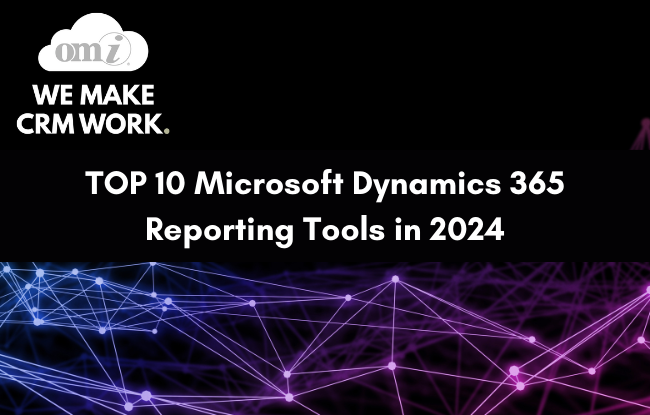In 2024, the Microsoft Dynamics 365 platform is still going strong, providing powerful out-of-the-box reporting capabilities that satisfy most business needs. However, some companies may have specific requirements and would want to work with their custom reports, or simply implement third-party tools of their own preference.
So, in this article, we’ll take a look at some of the Dynamics CRM reporting services available today, along with their pros and cons.
Report Wizard
We start with Microsoft’s native solution, the Report Wizard which comes with D365. Setting this up is fairly straightforward for power users, especially since it is the default reporting solution for D365. Sharing reports with other team members is also painless since, presumably, your entire structure will be running on the Dynamics platform.
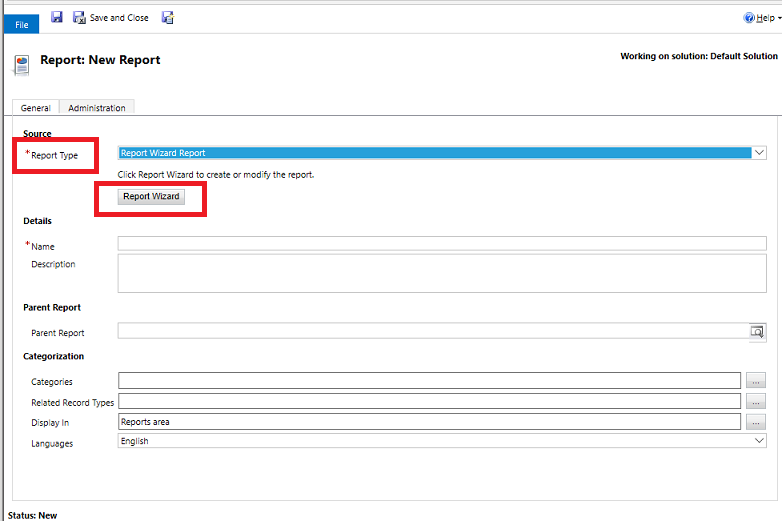
Source: Microsoft
Pros
- Native solution so integration is not an issue.
- Easy to set up.
- Extensively documented along with other Microsoft Dynamics Solutions.
- Access rights to reports are inherited from your Dynamics 365 configuration.
Cons
- The properties that you can edit for reports are limited.
- The data sources that you can link in reports are limited.
- The formatting options for the reports you produce are limited.
- No out-of-the-box scheduling for reports.
SSRS
SSRS (SQL Server Reporting Services) is a Microsoft product that gives you the ability to produce reports in different formats based on data from SQL servers and OTHER sources. You can use drag-and-drop tools to build and Design different types of reports.
Pros
- Packaged with Visual Studio.NET which means it is also possible to build bespoke reporting apps using the solution.
- Can work with different data sources.
- Offers more flexibility with the report formats you can produce.
Cons
- With the flexibility comes the potential for complexity in the customized code used to produce reports.
- Quality-of-life limitations like the lack of a print button, or the inability to add page numbers to reports.
- Requires technical expertise to successfully implement in some scenarios.
Power BI
This is a standard entry when it comes to some of the best reporting tools. It features AI capabilities, lots of options for data visualization, it’s tightly coupled with Excel, and has many different types of data connectors, with options for customization.

Source: Microsoft
Pros
- Advanced features, like the ability to use natural language processing to understand users’ requests.
- Able to produce interactive visuals.
- Capable of working with big data.
Cons
- Complex, requires training to use.
- Known to run into performance issues with extremely large data sets.
Power Automate
Power Automate is Microsoft’s solution for the automation of workflows and data sharing between D365 apps and services. This means that you can use it not just to automate business processes, but also to get data and provide notifications. In other words, to create reports.

Source: Microsoft
Pros
- Works with a multitude of data sources, including any publicly available APIs.
- Fairly easy to set up with step-by-step instructions on the learn Microsoft website.
- Is designed to work seamlessly with Dynamics 365.
Cons
- Limited report formatting options.
- Not ideal for complex business reporting scenarios.
Atlas
Atlas for Dynamics 365 is a third-party application by Insightsoftware that is specifically designed to tackle D365 reporting needs. The app is available on Microsoft’s AppSource platform and gives you the ability to produce reports for real-time data from any D365 solution. It has features that enable you to automate certain tasks, drill down into report details, and even link to Microsoft’s Power BI for more advanced reporting and visualization features.
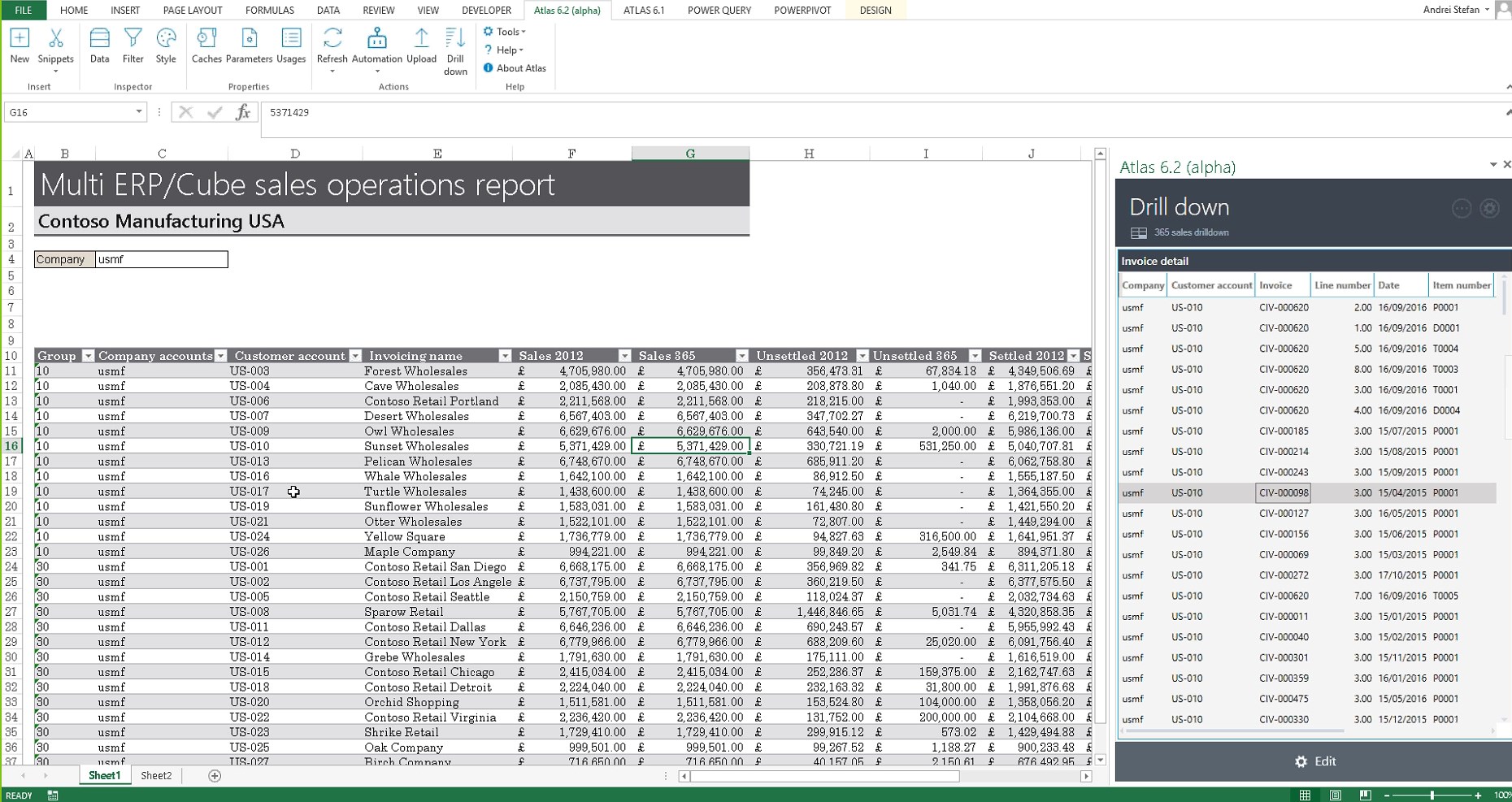
Source: Microsoft
Pros
- Specifically designed for D365 reporting needs.
- Provides automation features.
- Works seamlessly with Excel and other Office apps.
Cons
- Requires some expertise to master its coding system.
- Management and installation can be quite challenging without the necessary skills.
Jet Reports
Like Atlas, Jet Reports is another third-party solution specifically designed to provide enhanced D365 reporting capabilities. It works out of Excel and is made for D365 Business Central. It provides drag-and-drop capabilities that enable you to build different types of reports, financial, operational, and others.
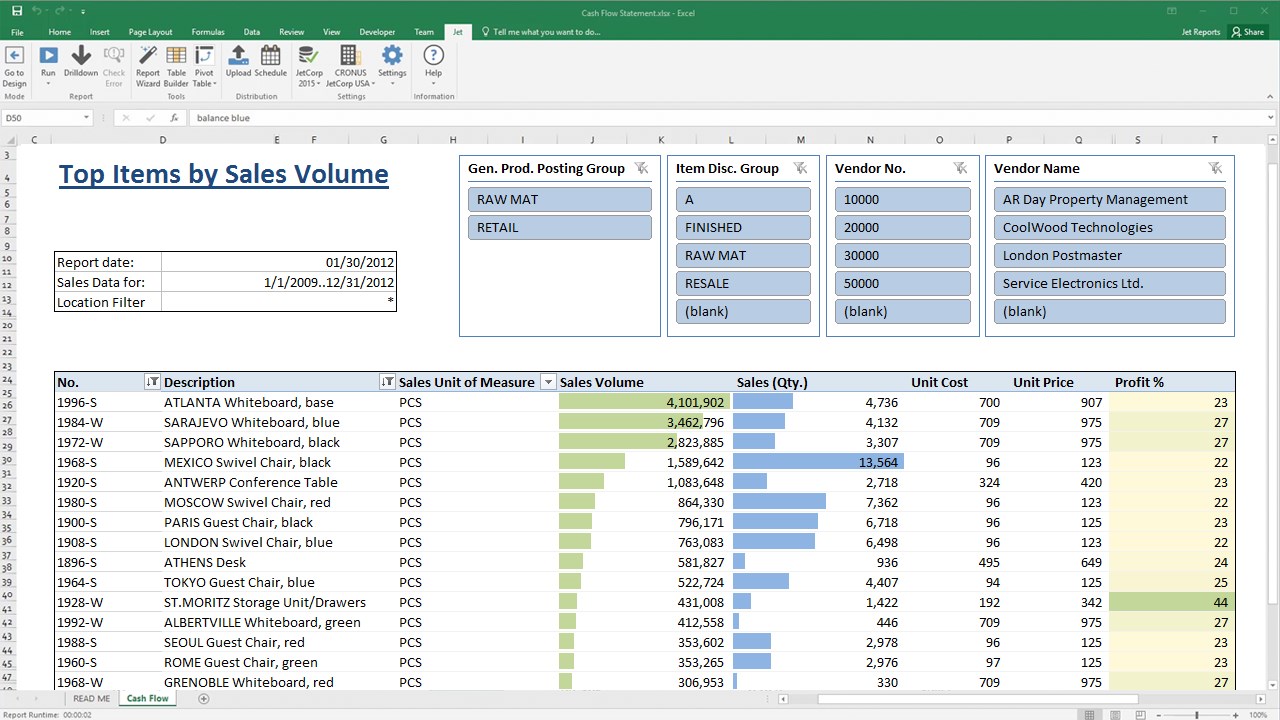
Source: Microsoft
Pros
- Easily and seamlessly adapts with Dynamics upgrades.
- Produces reports in Excel, meaning users without Jet Reports can still work with those files.
- Easy to use since it leverages Excel, an industry favourite when it comes to financial reporting.
Cons
- Some users have complained about a lack of help and information about the installation and configuration process.
Management Reporter
Management Reporter for Microsoft Dynamics ERP Brings an additional layer of flexibility when it comes to producing financial reports. You can add interactive notes to your reports and take advantage of instant messaging to make it easier to work with other stakeholders such as fellow team members, auditors, and other parties. Management reporter gives you reusable assets for creating rows, columns, and trees so that you don’t have to start every report from scratch.
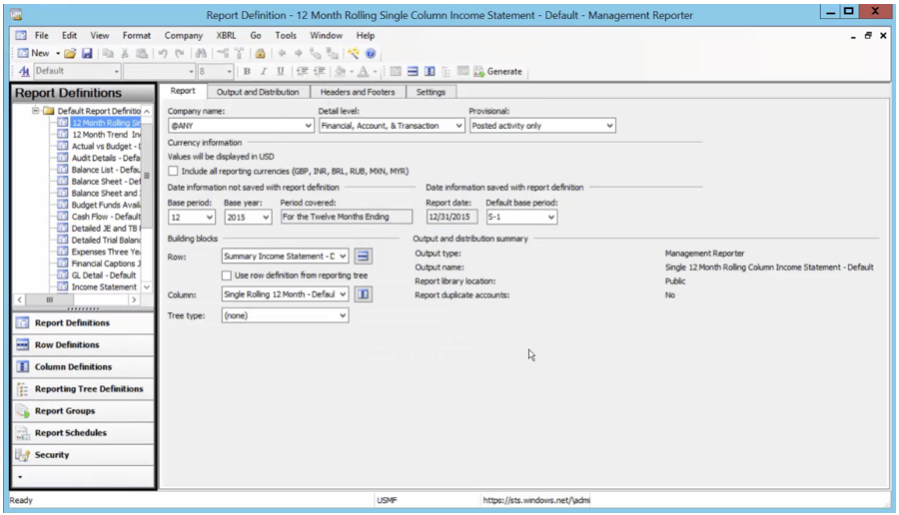
Source: Sherweb.com
Pros
- Support for different languages.
- Works with Dynamics 365 out of the box.
- Easy to use since it leverages Excel, an industry favourite when it comes to financial reporting.
Cons
- Sharing reports without SharePoint is not straightforward.
- Not possible to drill down into reports when a user is offline.
- No features for currency translation.
ClickDimensions

ClickDimensions is considered one of the best marketing automation tools for Microsoft Dynamics 365, offering features like web tracking, campaign automation, and lead scoring, among others. Its advanced reporting and analytics capabilities help businesses craft personalized customer experiences and use insights for improving campaign performance and customer behavior.
Pros
- Advanced email marketing features
- Comprehensive reporting
- Easy-to-use web forms, email templates, and surveys
Cons
- Reportedly unimpressive customer support
- Product is not always stable
- Only integrates with Microsoft Dynamics
Solver BI360

Solver BI360 is a business intelligence suite encompassing reporting, budgeting, forecasting, and dashboarding functionalities. It offers a panoramic view of financial and operational metrics, facilitating informed decision-making and helping users to get deep insights from within complex datasets.
Pros
- Intuitive Excel-based reporting
- Powerful cross-platform analytics
- Great integrations available
Cons
- Not the most user-friendly
- Underwhelming customer support
- Steep learning curve
ZAP Business Intelligence

ZAP Business Intelligence is a platform for data integration, analytics, and reporting. Its data integration capabilities facilitate connectivity with ERP systems, databases, and cloud applications, allowing teams to harmonize data for comprehensive analysis.
Pros
- Robust data integration capabilities
- User-friendly interface
- Automated discovery and learning
Cons
- Integrates poorly with Google Analytics
- May be too expensive for smaller teams
Implementing D365 Reporting Tools with OMI
Our vastly experienced and highly skilled team of software and data engineers have done everything from providing Cloud CRM solutions, data analytics, automation of different systems, custom platform development, business intelligence solutions, and much more. Take advantage of proven experience and competence to help you implement the right reporting tools for your particular business case.
CRMs are particularly powerful for the information and insights they provide. At OMI, we can help you not just set up your customer relationship management system to improve your business processes and produce the rewards you expect, but also to help you glean the insights that can give you the edge over the competition.
